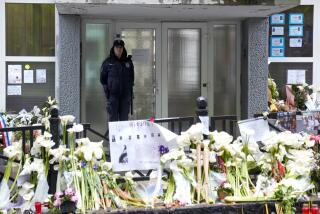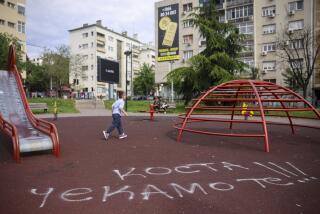Serbs Fail to Meet Weapons Deadline; Fighting Blamed
- Share via
SARAJEVO, Bosnia-Herzegovina — Serbian forces failed to meet a Saturday deadline to place their heavy weapons under U.N. supervision, but officials said the process had begun and they blamed heavy fighting for the delay.
U.N. officials said the Serbs complied around Sarajevo but not around Bihac and Jajce, where Croatian radio reported heavy fighting Saturday.
“Although this process is not yet completed, we believe this is a start,” U.N. envoy Cyrus R. Vance said in Belgrade, Yugoslavia.
Meanwhile, European Community foreign ministers meeting in Hatfield, England, agreed to support a U.S. proposal to impose a “no-fly” zone over Bosnia and said Serbia should be denied Yugoslavia’s seat at the United Nations.
But they decided to hold off on any action after their peace negotiator, Lord Owen, reported that the Bosnian Serbs had partially complied with the weapons deadline.
Sarajevo was relatively quiet, but overnight artillery and small-arms fire were reported around western suburbs. The Bosnian Health Ministry reported 31 people killed and 189 wounded across Bosnia in the 24-hour period that ended at noon Saturday.
Fighting also was reported around the eastern city of Gorazde.
More than 10,000 people have been killed in six months of warfare that broke out after Bosnia’s Muslims and Croats voted on Feb. 29 for independence, sparking a Serbian rebellion.
Under a recent agreement, Bosnian Serbs were to place their tanks and rocket launchers around Sarajevo, Gorazde, Bihac and Jajce under U.N. supervision by Saturday.
Vance said in a statement that the Serbs had finished moving weaponry at 11 sites around Sarajevo, but not in Bihac, in the northwest corner of Bosnia, and in Jajce, about 60 miles northwest of Sarajevo. He said the Serbs had already moved their guns away from Gorazde.
Vance said fighting around Jajce prevented U.N. observers from “making effective contact” with Serbian commanders.
The EC ministers’ decisions came after several hours of talks on the first day of a two-day informal meeting at Brocket Hall, a country mansion near Hatfield, 25 miles north of London.
The decision to recommend rejecting the claim to the U.N. Yugoslavia seat by Serbia and Montenegro--all that is left of the former Yugoslav federation--was a toning down of earlier demands by Britain and France for a permanent expulsion.
More to Read
Sign up for Essential California
The most important California stories and recommendations in your inbox every morning.
You may occasionally receive promotional content from the Los Angeles Times.













